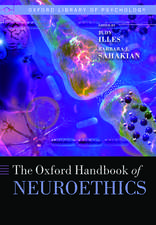Emerging Conceptual, Ethical and Policy Issues in Bionanotechnology: Philosophy and Medicine, cartea 101
Editat de Fabrice Jotteranden Limba Engleză Hardback – 25 sep 2008
| Toate formatele și edițiile | Preț | Express |
|---|---|---|
| Paperback (1) | 943.43 lei 6-8 săpt. | |
| SPRINGER NETHERLANDS – 30 noi 2010 | 943.43 lei 6-8 săpt. | |
| Hardback (1) | 949.42 lei 6-8 săpt. | |
| SPRINGER NETHERLANDS – 25 sep 2008 | 949.42 lei 6-8 săpt. |
Din seria Philosophy and Medicine
- 18%
 Preț: 3071.11 lei
Preț: 3071.11 lei - 18%
 Preț: 789.52 lei
Preț: 789.52 lei - 15%
 Preț: 636.80 lei
Preț: 636.80 lei - 15%
 Preț: 643.16 lei
Preț: 643.16 lei - 15%
 Preț: 644.95 lei
Preț: 644.95 lei - 18%
 Preț: 949.23 lei
Preț: 949.23 lei - 5%
 Preț: 1154.22 lei
Preț: 1154.22 lei - 18%
 Preț: 1223.74 lei
Preț: 1223.74 lei - 15%
 Preț: 645.60 lei
Preț: 645.60 lei - 18%
 Preț: 949.23 lei
Preț: 949.23 lei - 15%
 Preț: 644.49 lei
Preț: 644.49 lei - 18%
 Preț: 948.79 lei
Preț: 948.79 lei - 24%
 Preț: 780.13 lei
Preț: 780.13 lei - 18%
 Preț: 1227.04 lei
Preț: 1227.04 lei -
 Preț: 395.85 lei
Preț: 395.85 lei - 5%
 Preț: 1103.95 lei
Preț: 1103.95 lei - 18%
 Preț: 945.30 lei
Preț: 945.30 lei - 18%
 Preț: 1383.94 lei
Preț: 1383.94 lei - 15%
 Preț: 643.34 lei
Preț: 643.34 lei - 18%
 Preț: 1130.45 lei
Preț: 1130.45 lei - 15%
 Preț: 640.55 lei
Preț: 640.55 lei - 15%
 Preț: 639.59 lei
Preț: 639.59 lei -
 Preț: 389.70 lei
Preț: 389.70 lei - 18%
 Preț: 948.61 lei
Preț: 948.61 lei - 5%
 Preț: 1092.79 lei
Preț: 1092.79 lei - 20%
 Preț: 557.46 lei
Preț: 557.46 lei - 15%
 Preț: 642.36 lei
Preț: 642.36 lei -
 Preț: 385.08 lei
Preț: 385.08 lei - 15%
 Preț: 644.95 lei
Preț: 644.95 lei
Preț: 949.42 lei
Preț vechi: 1157.82 lei
-18% Nou
Puncte Express: 1424
Preț estimativ în valută:
181.69€ • 197.29$ • 152.62£
181.69€ • 197.29$ • 152.62£
Carte tipărită la comandă
Livrare economică 22 aprilie-06 mai
Preluare comenzi: 021 569.72.76
Specificații
ISBN-13: 9781402086489
ISBN-10: 1402086482
Pagini: 272
Ilustrații: VI, 264 p.
Dimensiuni: 155 x 235 x 24 mm
Greutate: 0.56 kg
Ediția:2008
Editura: SPRINGER NETHERLANDS
Colecția Springer
Seria Philosophy and Medicine
Locul publicării:Dordrecht, Netherlands
ISBN-10: 1402086482
Pagini: 272
Ilustrații: VI, 264 p.
Dimensiuni: 155 x 235 x 24 mm
Greutate: 0.56 kg
Ediția:2008
Editura: SPRINGER NETHERLANDS
Colecția Springer
Seria Philosophy and Medicine
Locul publicării:Dordrecht, Netherlands
Public țintă
ResearchCuprins
Beyond Feasibility: Why Ethics Is Important for Bionanotechnology.- Knowledge Production in Nanotechnoscience.- The World View of Nanotechnology – Philosophical Reflections.- Nanomachine: Technological Concept or Metaphor?.- No Future for Nanotechnology? Historical Development vs. Global Expansion.- Ethics and (Bio)Nanotechnology.- Bionanotechnology: A New Challenge for Ethical Reflection?.- Nanoparticles: Risk Management and the Precautionary Principle.- Anticipating the Unknown: The Ethics of Nanotechnology.- Applications of Nanotechnology in the Biomedical Sciences: Small Materials, Big Impacts, and Unknown Consequences.- Public Policy and (Bio)Nanotechnology.- Nanobiotechnology and Ethics: Converging Civil Society Discourses.- Allotropes of Fieldwork in Nanotechnology.- Law, Regulation and the Medical Use of Nanotechnology.- Human Enhancement and (Bio)Nanotechnology.- Stage Two Enhancements.- Nanotechnology, the Body and the Mind.- Nanotechnology and Human Flourishing: Toward a Framework for Assessing Radical Human Enhancements.
Recenzii
From the reviews:
"This is a very important book. The general public really have no clear idea of what happen in the next twenty years regarding medical care … and the manipulation of life. Fabrice Jotterand has brought … these issues to our attention in a non-dramatic, non-alarmist way … . this book will become a core text for students in the relevant disciplines and I suggest should be compulsory reading for those who in any way involved in policy decision making in the medical health care system." (Rob Harle, Metapsychology Online Reviews, Vol. 13 (19), 2008)
"This is a very important book. The general public really have no clear idea of what happen in the next twenty years regarding medical care … and the manipulation of life. Fabrice Jotterand has brought … these issues to our attention in a non-dramatic, non-alarmist way … . this book will become a core text for students in the relevant disciplines and I suggest should be compulsory reading for those who in any way involved in policy decision making in the medical health care system." (Rob Harle, Metapsychology Online Reviews, Vol. 13 (19), 2008)
Textul de pe ultima copertă
This volume provides a critical overview of the nature of nanotechnology (and its applications in the biomedical sciences, i.e. bionanotechnology) and the philosophical and ethico-legal issues it raises. This collection of thirteen articles represents an exploration by scholars from various disciplines (philosophy, anthropology, law, social sciences, psychology, and natural sciences) in North America and Europe. The book contains four major parts respectively entitled 1) Knowledge Production in Nanotechnoscience; 2) Ethics and (Bio)Nanotechnology; 3) Public Policy and (Bio)Nanotechnology; and 4) Human Enhancement and (Bio)Nanotechnology. In the first section, authors examine the nature of nanotechnology as a scientific project and critically reflect on its philosophical underpinnings. The next section introduces the readers to a new area of investigation that explicitly addresses the ethics of nanotechnology/bionanotechnology. More specifically, it examines the theoretical framework(s) necessary to sustain rich ethical reflections at the core of the development of nanotechnology. The third section expands on the ethics of nanotechnology/bionanotechnology but focuses on legal and public policy issues and how the public perception of nanotechnology could ultimately shape policies and regulations. Ultimately these three perspectives (the nature of nanotechnology, ethical approaches and regulatory issues) will shape and frame the discourse on nanobiotechnology. The final section focuses on how scientific progress could affect humans through enhancement technologies and critically assesses whether such progress actually contributes to human flourishing.
Caracteristici
The first volume to focus on the ethical and social issues emerging in nanotechnology Incorporates international perspectives on a topic of global importance Includes assessments from a variety of disciplines, including philosophy, anthropology, social sciences, law, psychology, and sciences

















